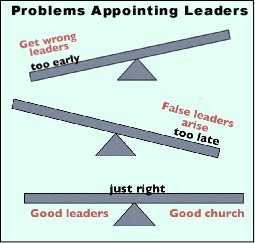“5 For this reason I left you in Crete, that you might set in order what remains, and appoint elders in every city as I directed you" (Titus 1:5)
Titus 1:5 'Development of Leadership,' page 2/5 of The Living Commentary, is an expository treatment of Titus 1:5 which introduces two ways to organize God's people: (1) Set in order what remains and (2) Appointing leaders. A Bible Study is included at the end. Intro to Titus 1:5-9 | Titus 1:5 Leadership | Titus 1:5 Organization | Titus 1:6-9 Standards | Titus 1:5-9 Bible Study Questions A. Developing Church Leaders (1:5)
|
|||||||
|
But what was it that he was to set in order or straighten out? It was the flocks scattered about Crete. Paul describes it as “what remains.” This could be understood in two ways. Firstly, it could mean that whatever believers and seekers Paul and Titus had led to the Lord. This would have made sense. In a more negative sense, it might refer to the difficult time the church had been going through as of late. In this scenario, some sheep were bitten, so-to-speak, by wolves. In other words, “what remains” refers to what has been left of the church after the false teachers had attacked them.
We might get critical at the situation of the church, but it is not rare that upcoming churches face very difficult times transitioning from missionary led churches to native-led churches. It is a topic that is often made mention of in mission studies. Paul’s letter itself not only admits that developing churches face extra problems but also that even in the midst of these problems, certain guidelines will help solve these problems.
Transition times are always difficult.
|
If the missionary stays too long, then they become dependent upon the missionary. If the missionary leaves too quickly, then the upcoming leaders will make significant mistakes in doctrine and practice which in the end will effect relationships. Leadership development often faces a crisis–there are only so many men at each place. They can grow only so quick. Paul’s practice and instruction in various places was “Do not lay hands upon any one too hastily” (1 Timothy 5:22). Who knows, perhaps Titus’ standard was a bit higher so there was no new appointed leadership.
Setting up the church involves organizing times to meet, procedure of worship, evangelism, prayer, etc. and of course leadership. This last aspect is what Paul mentions next to Titus.
2) Appoint elders in every city as I directed you (Titus 1:5)
The second thing that Titus was to do was to appoint elders. Paul was absent so Titus was given this job. Paul evidently had specifically given former instructions on doing this. This was no surprise to Titus. Again, we are not sure as to whether Paul is writing a short time afterwards and just clarifying his thoughts to Titus and the church. In any case, Paul was there brining additional training and clarity. He did not just put things off. If the church there needed to be further instructed, he wrote a letter. We must remember that writing a letter was a much more difficult thing to do back then. You needed to find someone to deliver it. All of this required great effort, money and tie. The post office as we now know it did not then exist. Let’s look at what paul actually said here.
• Appoint elders
This phrase is fairly easily understood. Of course, those from different church backgrounds will interpret this phrase ‘appoint elders’ in different ways. We need to be careful not to use our own church experience to interpret the situation back then. Those in churches with more ritual or liturgy tend to find the same in this situation and vice-a-versa. This word is not he same as the one for the ‘laying on of hands’ but is used several times with a similar meaning of put in charge (Matthew 24:47, Luke 12:44, Acts 6:3).
 Titus is not only instructed by Paul to put individuals in charge over the new church plants but also on who he should appoint. Although it seems that this is such a simple instruction, Paul actually is stating a lot in using this word ‘elder.’ He does not say, for instance, the word deacon. The churches later on would need deacons as they grew. They would work alongside the elders and pastors to carry out various tasks in the church (see Acts 6). But more important is the word ‘elders.’
Titus is not only instructed by Paul to put individuals in charge over the new church plants but also on who he should appoint. Although it seems that this is such a simple instruction, Paul actually is stating a lot in using this word ‘elder.’ He does not say, for instance, the word deacon. The churches later on would need deacons as they grew. They would work alongside the elders and pastors to carry out various tasks in the church (see Acts 6). But more important is the word ‘elders.’
The word for elder, as in English, comes from the word elderly. This position would be for the more mature, wise and experienced. In a congregation with primarily young people, elders would refer to those that are relatively older, stable and mature. If some churches waited until they had sixty-year-old elders, that church would then counter the instruction on appointing elders. The term ‘elder’ defines itself. We perhaps can say that men older than thirty years old would qualify in terms of age (assuming they were the older men in the congregation).
Application
• Elders are important. Maybe you will be an elder some day. Aspire to be one which can mightily serve the Lord and His people. Be service-oriented, diligent and knowledgeable in the Scriptures. We must not act selfishly. If God wants us to be an elder, then we should be. It is something that we should aspire to. “It is a trustworthy statement: if any man aspires to the office of overseer, it is a fine work he desires to do” 1 Timothy 3:1. We should not live our lives for ourselves but for the sake of others. We accept the sacrifices that come our way so that the church might be built up. Young men should dream about being an elder of God’s church. They should know the scriptures and cultivate a lifestyle where they prioritize their time so that they can serve the church of God from early on. Learn to control entertainment that steals our focus from the needs of others.
• Reach out. Following Paul’s spirit of concern, we need to do more to reach out to unchurched Christians (what remains). There are many individual Christians in our area that are coming and going. We must be diligent to follow these principles as much as possible. For us, if we are traveling, we must seek to worship with God’s people and purposely attach ourselves to them no matter how different they are from your own home church.
 Secondly, we are to be vigilant in seeking out and inviting those who profess Christ that live in or are visiting our area. I would suggest put an extra amount of money in the budget to welcome these Christians so that they are protected from the world. We spend much time and effort on attracting the unbeliever. All the more we should help the stranded believer. Our Chief Shepherd would appreciate that. We are established so we can help them in this way.
Secondly, we are to be vigilant in seeking out and inviting those who profess Christ that live in or are visiting our area. I would suggest put an extra amount of money in the budget to welcome these Christians so that they are protected from the world. We spend much time and effort on attracting the unbeliever. All the more we should help the stranded believer. Our Chief Shepherd would appreciate that. We are established so we can help them in this way.
Many so-called churches have left the Lord. Why should these unsuspecting believers be ensnared by false teachers? We need to do a much better job in protecting these ‘unchurched’ believers.
The word for elder is plural. As we further reflect on Titus 1:5 and the implication of the plurality of elders, we will address the much criticized topic of the organization of the church and the organizations of churches called denominations.
Other related articles from Biblical Foundations for Freedom:
Observe a mission church plant in Taiwan!Importance of joining a church.
Train those interested in full-time ministry
Intro to Titus 1:5-9 | Titus 1:5 Leadership | Titus 1:5 Organization | Titus 1:6-9 Standards | Titus 1:5-9 Bible Study Questions
BFF Titus Articles and Charts |
|
| Book of Titus Introduction Titus Outline Titus Map Titus 1:1a Paul - Titles Titus 1:5-9 Introduction |
Titus 2:1-2 Introduction Titus 2:1 Beliefs Titus 2:2 Lives Titus 2:1-2 Questions Titus 3:01-4 Questions Titus 3:09-15 Introduction Titus 3:09-11 Conversation Titus 3:12-14 Relationships Titus 3:15 Goodbyes Titus 3:09-15 Questions |
Book of Titus - Inductive Bible Training Study Questions Series
Learn how to do inductive Bible Studies! Purchase here
Titus Inductive Bible Study Questions: Introduction | Book study
Study Questions: Titus 1:1-4 | Titus 1:5-9 | Titus 1:10-16
Titus 2:1-10 | Titus 2:11-15 | Titus 3:1-8 | Titus 3:9-15
New American Standard Bible used
Biblical Foundations for Freedom
By Paul J. Bucknell
 Let us review the situation there in Crete. Paul was released from his Roman prison term in 62 A.D. This was the same as we saw at the end of the Book of Acts. Evidently, he went to Crete for a missionary trip. It seems that he and Titus had a great time of holding evangelistic meetings. God prospered them, and many came to believe. They might not have had a lot of believers in one spot, but some in many spots.
Let us review the situation there in Crete. Paul was released from his Roman prison term in 62 A.D. This was the same as we saw at the end of the Book of Acts. Evidently, he went to Crete for a missionary trip. It seems that he and Titus had a great time of holding evangelistic meetings. God prospered them, and many came to believe. They might not have had a lot of believers in one spot, but some in many spots.  It is also possible that Paul had first heard a report about how poorly the church was doing. In this scenario, Paul would be reminding Titus of his responsibilities an duties. He might have been neglectful or just overwhelmed by the opposition. In either case, it was a letter to strengthen and direct Titus to his duties and clarify Titus’ charge to the church.
It is also possible that Paul had first heard a report about how poorly the church was doing. In this scenario, Paul would be reminding Titus of his responsibilities an duties. He might have been neglectful or just overwhelmed by the opposition. In either case, it was a letter to strengthen and direct Titus to his duties and clarify Titus’ charge to the church.